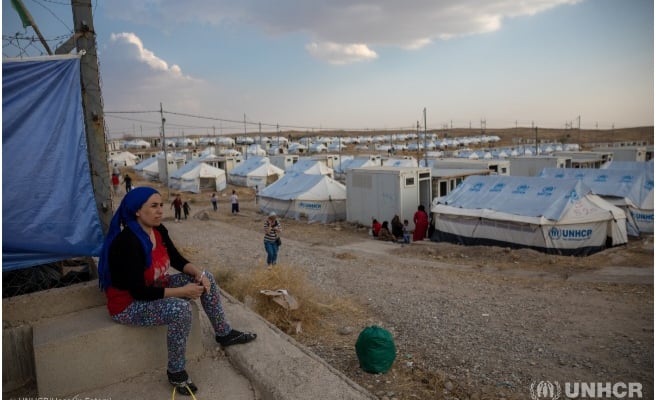On the afternoon of December 10, thousands of refugees marched on the streets near Montparnasse train station in southern Paris to protest the new Immigration Bill, which abolishes public health support for illegal immigrants who have been in France for more than 3 months.

Ahmada Siby, a Malian migrant, speaks out against France's immigration reform plan. Photo: DW
Marchers held signs declaring their opposition to the "Darmani law", named after France's interior minister. Others read "Immigration is not the problem - racism is".
The leader of the group, Ahmada Siby (33 years old, Malian), has been in France for nearly 5 years. Taking advantage of legal loopholes, Siby has used other people's documents to work as a cleaner, a maid, and recently a dishwasher.
“Most undocumented immigrants use this method, but it means we are paying social insurance fees and taxes without benefiting from services like regular public health care like French citizens,” Siby said.
Siby added that immigrants like him are doing all the toughest jobs, from working on construction sites, including for next summer's Paris Olympics, to working in restaurants and cleaning rented homes.

Siby and other migrants at a protest in Paris against the migration reform plan. Photo: DW
The draft law is expected to be discussed in the National Assembly, the lower house of France, starting on December 11 and could come into effect early next year.
The new immigration bill could tighten asylum by reducing the procedures and processing times for asylum applications, allowing for faster deportations of rejected asylum seekers without waiting for appeals. At the same time, the bill would make family reunification and medical aid for migrants more complicated and limited.
Previously considered inviolable cases such as those who arrived in France before the age of 13 or lived in France for more than 20 years can have their residence permit revoked and be deported if they are on the "blacklist" of French security agencies.
That's why Siby and others have come together to oppose the bill, which the French government says is a compromise that includes left- and right-wing measures.
France previously planned to issue one-year green cards to people working in sectors with labour shortages. But now the decision on the one-year permits rests with local authorities.

French Interior Minister Darmanin. Photo: AFP
The French government introduced the law largely as a safeguard against uncontrolled immigration and terrorism following a recent terrorist attack by a Russian immigrant on French teacher Dominique Bernard in the northern town of Arras. However, migrants, refugees and aid groups fear the new rules could increase stigma and discrimination.
Amid controversy over the new immigration bill, Alexis Izard, a Renaissance MP for the Essonne region south of Paris, said the final bill would be more balanced.
“We need to deport about 4,000 illegal immigrants who have committed crimes every year and that can be done with this new law,” he said, adding that the deportation process would take one year instead of two after the changes.
Alain Fontaine, owner of Le Mesturet restaurant in central Paris and head of the French Restaurateurs Association, expressed hope that the originally planned one-year green card would be reissued and even extended.
“Bars and restaurants wouldn’t be able to operate without 25 percent of our workforce being foreign,” said Fontaine, who counts about 12 of his 27 employees as foreign nationals.

Thousands of migrants cross the Mediterranean each year in the hope of a better life in Europe. Photo: AP
"We hope the government can legalize all of us, so we can freely choose the jobs we want," said Ahmada Siby.
Siby then looked back at photos of himself five years ago, when he arrived in Spain from Morocco in a small inflatable boat. He described the nearly day-long crossing as “the most difficult moment of my life” because everyone on board almost died.
“Once you survive this, you don’t give up. I am determined to fight for a better future,” Siby said.
Hoai Phuong (according to DW)
Source



![[Photo] Prime Minister Pham Minh Chinh chairs meeting to discuss tax solutions for Vietnam's import and export goods](https://vstatic.vietnam.vn/vietnam/resource/IMAGE/2025/4/10/19b9ed81ca2940b79fb8a0b9ccef539a)


![[Photo] Phuc Tho mulberry season – Sweet fruit from green agriculture](https://vstatic.vietnam.vn/vietnam/resource/IMAGE/2025/4/10/1710a51d63c84a5a92de1b9b4caaf3e5)

























![[Photo] Unique folk games at Chuong Village Festival](https://vstatic.vietnam.vn/vietnam/resource/IMAGE/2025/4/10/cff805a06fdd443b9474c017f98075a4)



















































![[Photo] Taking advantage of every sunny hour, asphalting the road through the old forest of Y Ty](https://vstatic.vietnam.vn/vietnam/resource/IMAGE/2025/4/11/c11987f152014781abe6aad9e09fb401)











Comment (0)